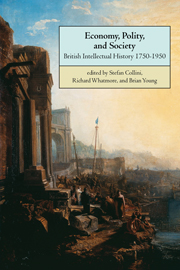Book contents
- Frontmatter
- Contents
- Preface
- General introduction
- Presentation of Economy, Polity, and Society
- Part I
- 1 Sociability and self-love in the theatre of moral sentiments: Mandeville to Adam Smith
- 2 ‘That noble disquiet’: meanings of liberty in the discourse of the North
- 3 Language, sociability, and history: some reflections on the foundations of Adam Smith's science of man
- 4 Adam Smith and tradition: the Wealth of Nations before Malthus
- Part II
- Part III
- List of contributors
- Acknowledgements
- Index
3 - Language, sociability, and history: some reflections on the foundations of Adam Smith's science of man
Published online by Cambridge University Press: 18 December 2009
- Frontmatter
- Contents
- Preface
- General introduction
- Presentation of Economy, Polity, and Society
- Part I
- 1 Sociability and self-love in the theatre of moral sentiments: Mandeville to Adam Smith
- 2 ‘That noble disquiet’: meanings of liberty in the discourse of the North
- 3 Language, sociability, and history: some reflections on the foundations of Adam Smith's science of man
- 4 Adam Smith and tradition: the Wealth of Nations before Malthus
- Part II
- Part III
- List of contributors
- Acknowledgements
- Index
Summary
Adam Smith is often described as a member of ‘the Scottish historical school’ and as the author of a science of man that was framed and focused by a distinctive theory of history. But what sort of historian was he? Smith always thought of ‘history’ in conventional terms, as the study of political and military events, their causes and consequences. Like William Robertson, however, he believed that such an enterprise had philosophic potential. He thought that Tacitus had transformed the traditional scope of history by paying attention to ‘the temper and internall disposition of the severall actors who had shaped events’ and had shown that history was of value to ‘a science no less usefull, to wit, the knowledge of the motives by which men act.’ But although history studied in this Tacitean fashion could yield up information about the minds of statesmen and generals and the secret causes of particular policies, Smith was more interested in a history which explained the hidden causes of civilisation's progress from its barbarous to its polished states in terms of changes in the means of subsistence and the distribution of property. It was a move which heralded the appearance of that celebrated stadial theory of history which Dugald Stewart, somewhat opaquely described as ‘conjectural history’ and which remains one of the intellectual glories of the Scottish Enlightenment.
- Type
- Chapter
- Information
- Economy, Polity, and SocietyBritish Intellectual History 1750–1950, pp. 70 - 84Publisher: Cambridge University PressPrint publication year: 2000
- 7
- Cited by



